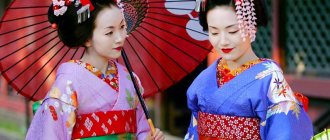Japan is a country with a distinctive and unique culture. And, of course, the mentality, habits, and characteristics of the Japanese are radically different from what is inherent in people who grew up in the West.
Europeans or Americans who find themselves on the streets of Japanese cities are surprised by many things. But seven traits that are common to all the inhabitants of this country are especially striking to people who grew up in the West.
Trait one: punctuality
The Japanese are obsessively punctual. In this country, a delay of a fraction of a minute is already perceived as nonsense, as something completely unacceptable. For example, once representatives of a Japanese transport company appeared in the media with a public apology to passengers because the transport delay was 25 seconds.
Conductors on trains, as well as city transport workers, issue passengers with special receipts indicating the fact of the delay. In this case, one minute is considered late.
For dry skin I make homemade soap with goat milk: I’m very pleased with the effect
How carousing destroyed a very beautiful couple: the love story of Vysotsky and Vladi
Even a capricious thorn will bloom: what needs to be done to make a cactus produce a bud
Trait two: hard work
No Japanese would object to working overtime. Moreover, residents of this country may not leave their workplace at all for days, resting in special rooms or right at the table.
This is not nonsense in Japan, but the norm. If there is work to be done, employees will stay and do what is required, regardless of personal circumstances. There is nothing more important than work for the Japanese.
Cultural characteristics of the Japanese people
Japanese culture is extremely rich and diverse. The Japanese express a heightened feeling in almost all areas of life, including cultural traditions. Despite the fact that each region has some differences in this area, family traditions are sacredly respected here, and they attach great importance to national holidays and various rituals. One of the main distinguishing features of the Japanese is their elevated attitude towards the world around them. Only the subtle spiritual organization of the inhabitants can so poetically glorify the forces of nature in their creativity. The Japanese have no less scrupulous attitude towards flowers, which is expressed by the development of various styles of flower arrangements - ikebana, rikka, nageire, seike. The tea ceremony, founded by Sen no Rikyu, occupies a special place among the Japanese. To learn this difficult custom requires quite a long time and endurance, which the Japanese do not have to spare. An important feature of the ceremony is not only the process of drinking tea, but also the aesthetic pleasure that guests receive during the entire process. The ancient ritual takes place in specially designated rooms and represents one of the most important and meaningful national traditions.
Trait three: neglect of vacations
The Japanese don't like weekends. No Westerner can understand this. An average Japanese resident spends an average of 200-400 hours more at work per year than any European.
But that's not all. The Japanese often neglect their paid vacations. About 17% of Japanese residents have never used their vacation right at all. Even strikes in this country are very original. For example, public transport workers continue to work during strikes, but do not charge passengers for travel.
Put on a hat and other rules from childhood that we constantly broke
High waist and fringe: the most fashionable jeans models for 2021
Nikolaev's wife insulted the concert producer because of a parking space
Ethnopsychological portrait of the Japanese
Ethnopsychological portrait of the Japanese
Good afternoon, dear readers of our automotive blog. Today I would like to move a little away from the automotive theme, because it’s the first days of spring and I want to touch a little on Japan and the Japanese themselves, from a slightly different side. Well, let's begin...
The main problem of a person who is far from professional Japanese studies, but who strives to get to know Japan, is the chaotic, superficial collection of information about a given country from unreliable sources and the formation of his own idea based on it. It is thanks to this trend that journalistic publications dedicated to travel, in the vast majority of articles about Japan, lead the reader to the idea: the only disadvantage of the Land of the Rising Sun is its complete compliance with stereotypes. Having visited Japan once and stayed there from one to several weeks, many are inclined to believe that they have received more than enough information about the country and its people, and have learned everything that is surprising and different from their own worldview.
It is impossible to truly get to know Japan
. Read also:
- How to choose the right tires for a car?
In turn, Japanese scholars argue: it is unrealistic to truly get to know Japan without a sincere desire to study it, but with short-term idle interest. The features of Japanese culture and life are immensely wide, and even an orientalist cannot cover them. Consequently, it is impossible to draw a conclusion about whether Japan corresponds or does not correspond to at least one widely known stereotype.
As for this article, its purpose is to examine the main features that make up the national character of the Japanese, as well as their customs. Not so much in order to present fundamentally new facts, but in order to outline the trajectory of further study of this country - to identify those things without which it would be difficult to move forward.
Japanese national character
So, speaking about national character, it is first necessary to mention collectivism. The rooting of collectivism at the expense of individualism in Japanese society occurred due to several factors, the main of which can be identified as the need for large groups of people to live in a limited area. Japan's topography is approximately 75% mountainous: the shortage of land suitable for life in general and farming in particular has existed for many centuries. In this regard, the Japanese were forced to live closely with each other, which is why they honed the skill of working in a group to perfection (it is worth noting that the spread of flood rice farming, which requires peasants to build complex irrigation structures and a well-established process of joint cultivation of the field, also played an important role here) and acquired the ability to smooth out emerging conflicts through joint problem solving. The concepts of “amae” - dependence on people and the desire to live in harmony with them, and “giri” - duty were clearly established in the minds of the Japanese. Each of them imposes responsibilities on a person that do not allow him to live outside of society.
Being in a group is an integral part of every Japanese life.
Being in a group is an integral part of every Japanese life. The Japanese education system implies the presence of relative freedom of action and expression of individuality, contrary to established social rules, in a child only up to 5 years old. Further, a number of restrictions and responsibilities are imposed on him, aimed, first of all, at group activities in the future. Starting from the elementary grades of school, the child is constantly in a team whose activities directly affect him. Therefore, the Japanese, being already adult independent people and having different social statuses, still try to position themselves as a single group: in Japan, displaying one’s wealth is not accepted, and the presence of property “beyond one’s means” is, as a rule, condemned by people. sides of others. Money as a means of encouragement sometimes does not play a primary role for the Japanese: non-material incentives, such as approval from the group, are very important to them.
Despite the fact that in conditions of collectivism the personal qualities of the Japanese are infringed, they highly value the fact that they feel protected in the group. In the Japanese environment, there is always mutual assistance, which is especially clearly seen in the interaction of employees of large and medium-sized companies with each other. Unlike many Western countries, including Russia, Japan has a developed mentoring system (“senpai-ko:hai”). For a new employee, his “old-timer” colleagues will explain his responsibilities in detail (the presence of clear instructions and the refusal to be creative in performing assigned tasks is also a striking feature of the scheme by which the work of most Japanese is structured) and will tell him about the internal structure of the company in order to make the initial period easier for him working in a new team. In the future, senpai continue to look after the ko:hai, being ready to provide support in a difficult situation. In the same way, CEOs try to take care of all their employees. For example, the manager of an industrial company usually has regular visits to his enterprises and direct communication with workers in order to clarify current problems in production. Ordinary workers, in turn, as a demonstration of loyalty to the work group, often stay overtime and refuse vacations - at a certain point, Japanese residents were even legally required to go on vacation for at least a few days a year.
As we can see, the system of paternalism (“oya-ko”) in Japanese companies, based on the ideas of Confucianism, implies the presence of responsibilities both for kobun - private employees, and for oyabun - high-ranking officials. The system strengthens labor relations in the team, which creates a comfortable atmosphere for workers even in difficult working conditions and increases work efficiency. The need for strict observance of subordination in conditions of paternalism contributes to the development among the Japanese of modesty, devotion to the authority of the leader, as well as a sense of duty, which determines the ability to unquestioningly follow instructions.
The Japanese are the most hardworking nation.
Here we should touch upon another feature of the Japanese national character - hard work. As can already be seen from the example of the refusal of the vast majority of workers to even take a short rest, Japanese hard work is striking in its widespread nature. In addition, the Japanese are able to perform precise, monotonous work for years, which, coupled with building relationships in society on trust and increased attention to the actions of both their own and others, leads to an increase and subsequent maintenance of product quality in the country’s domestic market at an unprecedentedly high level .
From the above we can conclude that the Japanese are a disciplined people, accustomed to strictly following formalities. The latter is also due to the extreme conservatism of the Japanese nation. In particular, in business, this is expressed in the fact that the Japanese try to preserve their traditional principles as much as possible when doing business in other countries, so they often delegate the work process to intermediary companies. The official representatives of Japanese companies abroad are always Japanese (with the exception of Toyota in the USA, due to the dismissal of a Japanese representative due to a sex scandal). As a rule, they “stay in the shadows” and make key decisions, consulting exclusively with the central Japanese leadership. The company's branch recruits personnel who do not speak Japanese and have no connection to Japan - for the purpose of “corporate security”.
Official representatives of Japanese companies abroad are always Japanese.
However, traditionalism is reflected not only in work, but also in the entire life of the Japanese in general. This can be examined in more detail using numerous examples of customs and traditional concepts that are well established in Japan at the moment.
More on the topic:
- How to choose the right tires for a car?
Starting a conversation about traditions, perhaps, it is necessary to briefly talk about the religious features characteristic of Japan. More than 90% of Japanese consider themselves Shintoists and/or Buddhists. The fact is that after coming to Japan in the 5th century. AD, Buddhism is closely intertwined with the original religion of the Japanese - Shinto:. Modern Japanese perform rituals of both Shinto and Buddhist cults, without trying to distinguish between the two religions in their minds. However, rituals associated with joyful events in the life of a Japanese person - a wedding, the birth of a child, etc. - are the prerogative of Shintoism, while funerals are usually held according to Buddhist rites. This phenomenon is also due to the fact that the Japanese in general are not very religious and perform rituals, rather, out of habit.
The religious life of the Japanese nowadays most often obeys the concept once formulated in the West: “born Shintoist - marry Christian - die Buddhist” (here it should be noted that the Christian wedding ceremony is extremely popular in Japan due to its aesthetics, and often, if funds are available , the wedding is carried out according to the rituals of all three religions). Many Japanese festivals are associated with religion and folk beliefs, the main ones of which will be listed below.
Unlike the Russian tradition, the Japanese New Year is actually celebrated on its eve: until 00:00 on January 1.
Unlike the Russian tradition, the Japanese New Year is actually celebrated on its eve: until 00:00 on January 1. After midnight, the Japanese go to temples, where they burn daruma figurines purchased at the beginning of last year, which, according to legend, grant wishes. Also, during the celebration, temple servants ring the bell 108 times - it is believed that this ritual can cleanse a person of vices.
The Japanese also pay significant attention to certain milestones in the life cycle. So, the second important moment in the life of a child after birth is when boys reach the ages of 3 and 5, and girls - 3 and 7 years old. This event is dedicated to Shichigosan - a holiday that arose in the Heian era thanks to the custom of celebrating the “lucky”, from the point of view of Japanese numerology, years of children’s lives (also, due to the high infant mortality rate, it was believed that each year a child lives increases his chances of further life in world of people). Celebrated around November 15th, Shichigosan involves traditionally dressed children visiting Shinto shrines with their parents:. There are also 2 more holidays dedicated to children - Hina Matsuri - Girls' Day, celebrated on March 3 and famous, first of all, for the tradition of displaying altars with national dolls, and Children's Day, formerly known as Boys' Day, celebrated on May 5 and associated with hanging kites in the shape of carp - koi-nobori - on houses, symbolizing perseverance and courage.
Coming of Age Day in Japan
The next major event in a Japanese life is coming of age. The Seijin-no-hi holiday, dedicated to him, is celebrated annually on January 15 by all young people who turned 20 years old the previous year.
Lush festivities and large expenses are also associated with a wedding, which, as already noted, is usually held in accordance with several religious traditions. As a rule, the Japanese marry quite late - about 30 years old, which, in turn, pushes the age of first motherhood to approximately the same figure and is one of the immediate reasons for the rapid aging of the Japanese nation.
Next, in the life of a Japanese, from the point of view of the presence of important milestones, there comes a significant “break” that lasts until he reaches retirement age (65 years). Keiro:-no-hi is dedicated to pensioners - Day of Honoring the Elderly, celebrated annually on September 15. At the moment, the opinion of the elderly in the family, although it was dominant previously, is increasingly losing its significance. However, despite this, the Japanese respect their elders and consider it their duty to provide them with all possible help.
Finally, the last important event in the life cycle of a Japanese is his death. Following Buddhist funeral rites, the body of the deceased is cremated, after which the ashes are returned to the family for burial. The cult of ancestors, dating back to ancient times, is of enormous importance for the Japanese, so large memorial services are held 4 times a year - on the New Year, in Higan - the days of the spring and autumn equinox (March 21 and September 21, respectively), as well as during the summer O-bon holiday. The Japanese view death in a completely different way from the Europeans: it is believed that a deceased relative does not leave home, but remains in the family, simply moving to a higher level, becoming the guardian of the living, demanding respect, and not grief for himself.
Thanks to the calendar of Japanese holidays, it is possible to determine other things not related to religion that are important to the ordinary Japanese. Studying the calendar further, we notice that the Japanese have great respect for nature: as many as 2 public holidays are dedicated to it - Greenery Day and Sea Day (April 29 and July 20). The Japanese have cultivated a love of nature since time immemorial. Obviously, this is due to the fact that Shinto: is a religion based on animistic beliefs: according to Shintoists, every natural object can become a container for the spirit. This statement undoubtedly implies a reverent attitude towards the environment. It is also worth noting that the ability to admire the beauty of the surrounding world is another feature characteristic of the Japanese national character. Everyone knows the Japanese tradition of contemplating natural phenomena, be it admiring flowers - hanami, or the moon - tsukimi...
Tokyo on the Birthday of the reigning Emperor Akihito
The Japanese also revere their country and its laws: public holidays are the birthday of the current emperor - Akihito (December 23), Founding Day and Constitution Day (February 11 and May 3, respectively). It should be noted that Japan is a country consisting almost entirely of law-abiding citizens and has one of the lowest crime rates in the world (for example, until recently, theft in Japan was practically absent as a phenomenon, and began to develop mainly due to the influx into the country migrants). The Japanese report any observed violations to the police, even if the offender is an old acquaintance. Here, Japanese people are guided by the principles of giri, believing that in such situations partiality cannot be appropriate. Representatives of the criminal world and the police comply with the “social contract”: the former do not harm ordinary citizens, and the latter do not interfere in the affairs of the former.
MARTIAL ARTS AND EDUCATION IN JAPAN
Much attention is paid in modern Japan to physical education. On October 10, Sports Day, a lot of sporting events are held throughout the country, especially in schools and universities. Many sports sections have been opened at educational institutions, the main purpose of which is to strengthen the health of future generations. The Japanese love not only to play sports themselves, but also to watch professional competitions: the most popular sports in the Land of the Rising Sun are golf, sumo and baseball.
The Japanese carefully preserve their culture, remembering their rich heritage not only on Culture Day (November 3), even though about 5 thousand government awards for achievements in this field are released annually on this day in Japan. Traditionalism has allowed the most ancient skills to survive to this day - sword making, calligraphy, creating ikebana flower arrangements, etc. Despite the fact that creativity began to prevail over copying in Japanese art only recently, the Japanese have long admired not only objects of material national culture, but also works of intellectual labor. Japanese folklore does not perish either: beloved by adults and children, legends about mystical creatures - werewolves kitsune and tanuki, mermaids, spirits of sea and river water, forests - are passed on from generation to generation.
Now Japanese youth strive to be like the youth of other developed countries
Read also:
- The Japanese automaker is not going to abandon Avensis
- Ethnopsychological portrait of the Japanese
However, in the era of globalization, even in Japanese society, whose representatives are accustomed to strictly adhering to the principle of “friend or foe” (“uchi-soto”), more and more new trends are penetrating. The West brought many trends of the last 50-70 years into the life of Japanese society. Nowadays, Japanese youth strive to be like the youth of other developed countries, and increasingly, traditionalism is perceived by young people as something hostile, preventing them from being themselves. This circumstance led to the emergence of a great variety of subcultures in Japan, starting with global branches (punks, goths, etc.) and ending with unique Japanese movements, such as fruits, gyaru, otaku, j-rock (best known by representatives of the visual kei movement) . Perhaps, over time, the spirit of rebellion emanating from the living and liberated representatives of youth movements will embrace most of the population of the Japanese islands, and the collectivist system will be broken, but there is no reason to believe that this will happen in the coming decades.
As mentioned at the beginning, it is impossible to show all the depth hidden in the Japanese way of life by writing even a book of several volumes. However, what is presented on several pages above could serve as a brief prologue to a long study of this amazing eastern country.
Best wishes to you. We really hope that this material was useful to you. Thank you very much for the likes :))
Trait four: politeness
The Japanese are the most polite people in the world. This trait of theirs manifests itself in everything, in every detail. Residents of Japan are never rude; when meeting acquaintances, they bow three times.
If a Japanese, through negligence, accidentally caused inconvenience to someone, he will apologize for a long time, until he understands that the victim is obvious about his sincere repentance. The Japanese do not forget to give thanks for every little thing.
Feature five: the habit of cleanliness
The Japanese habit of cleanliness is just as exaggerated as that of punctuality. Japanese streets are clean not at all because there are a large number of street cleaners working there, but because Japanese residents do not litter and clean up after themselves.
For example, there are no cleaners in schools. Children and teachers themselves maintain cleanliness in buildings and surrounding areas.
Why flights from Russia to the USA are dangerous to health
The girl gained fame after she hung an advertisement on a pole
Star of the series “For the first person you meet” Alexander Pashkov: about career and love
Japanese spirituality
The Japanese people's calm attitude towards religiosity is due to the formation of several spiritual directions over the years. But still, Buddhism and Sentoism have the main influence on the way of life of the population. A large number of temples, both ancient and modern, impress with their majesty and originality. Despite the technological progress that has engulfed one of the oldest countries on the planet, people here take the observance of local rituals quite seriously. In addition to visiting Buddhist and Sento shrines, a third of the population periodically makes pilgrimages, which has a positive effect on the level of spirituality of the Japanese.
Trait six: healthy eating
In the West, many people believe that the Japanese eat only rice and seaweed. But actually it is not.
Rice is indeed a staple in the Japanese diet, but it is far from the only one. The Japanese carefully monitor their diet, and their menu includes seafood, fish, fresh vegetables and fruits, and meat. The usual Japanese diet is actually a guide to a healthy and balanced diet.
Trait seven: physical activity
The Japanese are the healthiest nation in the world.
And this is largely due to their lifestyle. 98% of children cycle to school, and older people regularly exercise outdoors.
After eating, the Japanese have a habit of walking. This prevents obesity and promotes good digestion. There is not a single Japanese who does not do exercises every day. Even those who stay in offices to work overtime find time for physical activity. Residents of this country also have a habit of spending as much time as possible outdoors.
Found a violation? Report content
Features of national character
In addition to their adherence to national customs and love of nature, the Japanese can safely be called workaholics. This wonderful people is distinguished by a special responsibility and sense of duty, characterizing each resident as an example of a disciplined and efficient worker. In everyday life, the Japanese are characterized by such traits as politeness, goodwill, and respect for the older generation. The upbringing of children has an important influence on family relationships, which consists of teaching them to observe subordination in relation to the older generation. In this way, a sense of community and valued interests develops. First of all, this concerns a certain group, which is a prerequisite for the development of such qualities as a sense of duty and devotion to authority. In the daily life of the Japanese, friendliness and friendliness are self-evident concepts. Starting from a salesperson in a store, who will show maximum courtesy in service, to an expensive restaurant, where any client will be served with a smile, not because of high tips, but because politeness is an everyday norm among the Japanese. An equally important trait of the average Japanese is curiosity, characterized by a certain direction. This is partly due to the influence of Buddhist culture on the thinking of the population, which is distinguished by certain specifics.









